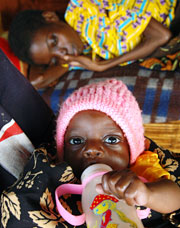 We live in a busy world - there's no denying it. We hear it so often when greeting each other in our customary way. "How are you?" "Oh, I'm just soooo busy . . ." and then comes the litany of frenetic activities overflowing in our lives. The chaos seems to spill over into just about every area we could imagine.
We live in a busy world - there's no denying it. We hear it so often when greeting each other in our customary way. "How are you?" "Oh, I'm just soooo busy . . ." and then comes the litany of frenetic activities overflowing in our lives. The chaos seems to spill over into just about every area we could imagine.I've been thinking of this cultural phenomenon for a few reasons. First, you may have noticed that I haven't posted anything for a few weeks. My simple explanation - I was too busy with the activities that surround the Christmas season. Our busyness is magnified at this time of year. In many ways it is a good busyness, but I often wonder what the costs might be.
Secondly, I've been reading a few articles related to our skimming the surface of life because we are too busy to explore the deep waters. Most of these articles come from the current volume of Weavings, which is a journal of the Christian spiritual life. I would encourage you, if you don't already, to pick up this journal and read through it. It is a wonderful resource for spiritual reflection.
I found Hinson's article, "The Quantity Quotient Behind Busyness," especially apropos. Meteorologists give us the temperature, but they also include the chill factor in the winter and the heat index in the summer. In a similar fashion we should add the "quantity quotient" to our interpretation of our overwhelming activity. The "quantity quotient" is simply the recognition that through the cruel twist of our culture's logic our quantity of activity determines our importance. We are easily caught in a vicious cycle that leaves us ragged, worn, and empty.
Something is out of wack in our society. The disease of workaholism is ubiquitous. However, it is almost impossible to treat the illness, because in our culture unlike a number of other illnesses, this one is socially approved. We hear people rave in admiration over those who extend themselves to the brink of collapse. People are killing themselves through this addiction to activity; their family relationships begin to unravel, and we stand by applauding and encouraging them in this destructive behavior.
Is this what God desires for us? NO! "Be still, and know that I am God." (Ps. 46:10) We will never know the depths of life with the Living God if we are caught up in the activities of our own little worlds. In fact, the Lord God takes slaves that are accustomed to working long hours, 7 days a week, and what is His command to them? You will take a day off! "Remember the Sabbath day and keep it holy." The Hebrew word shabbat simply means to cease, to stop, to rest. The one who created us and knows us better than we know ourselves, calls us to a day of rest.
On the other hand, that doesn't mean that we should encourage sloth. Work is a good thing. The point is to keep our priorities in order and to place work within it's proper boundaries. However, it is not only work that results in our busyness. We need to recognize our limitations as human beings and as a result we should limit our involvement in various activities, regardless of how good they might be.
Why are we so easily caught in this web of activity? I believe that Hinson assesses our situation adequately as he says, "If we are honest, I think that we have to recognize that while our culture creates part of our problem, it's deeper roots lie in ourselves, in selves that never feel adequate." Since a higher quantity of activity boosts our egos, we attempt to fill every moment leaving little room for quiet, reflection, Scripture reading, meditation, and prayer. This only exacerbates the problem because it leaves the root cause untreated.
As we are rooted and grounded in a loving relationship with God, we find that our value and worth lies not in the quantity of frenetic activity that fills our life, but rather it is in the value ascribed to us by the Lord of the Universe. Therefore, to confront this destructive busyness in our lives we must do as Jesus commanded, "Seek first the Kingdom of God and His righteousness . . ." As we seek God with all our heart, mind, soul, and strength then we allow ourselves to be found by Him, sensing His forgiveness, peace, and presence we are set free from the forces of chaos. When God forgives us and invites us into His presence we receive a contingent worth that may only be found in this relationship, but it is a deeper value than we could find in ourselves or anything else. This value releases us from the prison of striving for worth through busy activity.
And so, especially during this season, may you weave Sabbath moments throughout your day to "be still" and know your finite existence in the presence of the Infinite One. Through these moments may we receive the value that can only be found in God enabling us to live in and breath forth His loving presence at all times. Blessings ~ RLS







